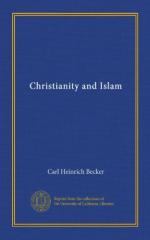The religion now known as Islam is as near to the preaching of Muhammed or as remote from it, as modern Catholicism or Protestant Christianity is at variance or in harmony with the teaching of Jesus. The simple beliefs of the prophet and his contemporaries are separated by a long course of development from the complicated religious system in its unity and diversity which Islam now presents to us. The course of this development was greatly influenced by Christianity, but Christian ideas had been operative upon Muhammed’s eager intellectual life at an even earlier date. We must attempt to realise the working of his mind, if we are to gain a comprehension of the original position of Islam with regard to Christianity. The task is not so difficult in Muhammed’s case as in that of others who have founded religious systems: we have records of his philosophical views, important even though fragmentary, while vivid descriptions of his experiences have been transmitted to us in his own words, which have escaped the modifying influence of tradition at second hand. Muhammed had an indefinite idea of the word of God as known to him from other religions. He was unable to realise this idea effectively except as an immediate revelation; hence throughout the Qoran he represents God as speaking in the first person and himself appears as the interlocutor. Even direct commands to the congregation are introduced by the stereotyped “speak”; it was of primary importance that the Qoran should be regarded as God’s word and not as man’s. This fact largely contributed to secure an uncontaminated transmission of the text, which seems also to have been left by Muhammed himself in definite form. Its intentional obscurity of expression does not facilitate the task of the inquirer, but it provides, none the less, considerable information concerning the religious progress of its author. Here we are upon firmer ground than when we attempt to describe Muhammed’s outward life, the first half of which is wrapped in obscurity no less profound than that which veils the youth of the Founder of Christianity.
Muhammed’s contemporaries lived amid religious indifference. The majority of the Arabs were heathen and their religious aspirations were satisfied by local cults of the Old Semitic character. They may have preserved the religious institutions of the great South Arabian civilisation, which was then in a state of decadence; the beginnings of Islam may also have been influenced by the ideas of this civilisation, which research is only now revealing to us: but these points must remain undecided for the time being. South Arabian civilisation was certainly not confined to the South, nor could an organised township such as Mecca remain outside its sphere of influence: but the scanty information which has reached us concerning the religious life of the Arabs anterior to Islam might also be explained by supposing them to have followed a similar course of development. In any case,




